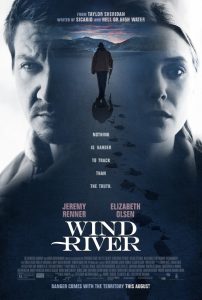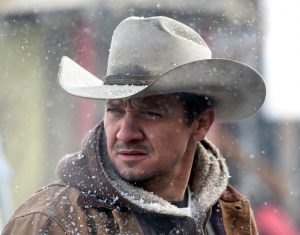Film Review: “Wind River” Blasts a Powerful Narrative Spell
Written by: Christopher Llewellyn Reed | August 22nd, 2017

Wind River (Taylor Sheridan, 2017) 3½ out of 4 stars.
There’s a little part of me that questions the narrative agenda of actor-turned-writer-turned-director Taylor Sheridan’s taut, existential thriller Wind River, which manages to be serious, entertaining and seriously entertaining. Set in and around Wyoming’s Wind River Indian Reservation – “home to the Eastern Shoshone and the Northern Arapaho tribes” (as its website declares) – this sophomore directing effort (his first was the 2011 horror film Vile) from the man who wrote last year’s brilliant Hell or High Water tackles issues of violence, retribution, Manifest Destiny, and, most of all, reconciliation in ways that elevate the murder-mystery material far beyond the pedestrian whodunnit. This seems to be Sheridan’s wheelhouse, as he did much the same thing in Hell or High Water. Still, despite my enthusiasm for the movie, I can’t quite tune out the little voice that questions Sheridan’s own enthusiasm for the allure of on-screen violence, as well as his choice to have his main (white, male) character be the only one with real, effective agency. Others try, but only he gets things done. So be it. It’s still a powerful story, well told (but minus that half star in my rating).

Fred Hayes/The Weinstein Company
The movie begins with a bang, as protagonist Cory (a perfectly cast Jeremy Renner, Kill the Messenger) shoots and kills a coyote (or wolf) as it prepares to attack a herd of goats. This is Cory’s job: he’s a predator hunter for the U.S. Fish and Wildlife Service, there to make sure the livestock stays safe. Soon, he’s called to do a job on the reservation, where a mountain lion has been killing cattle. He brings his young son, stopping off at his ex-wife’s place to pick him up. She’s Arapaho, and we discover that Cory shares a deep connection to the land and its people. What he and his wife share, however, is unclear; they’re both very sad, like people who have loved and lost and don’t have the tools to express either feeling. But Cory is a loving father, though he quickly gets distracted once he drops his boy off at his in-laws. Though he finds the lion’s tracks, it’s the dead human woman he discovers, in the snow (we’re in the middle of winter) that takes precedence over all other concerns. Cory reports the death to Ben, the tribal police chief (the always reliable Graham Greene, of Syfy’s Defiance), an old friend, and soon Ben calls the FBI. They send Jane (a strong Elizabeth Olsen, Ingrid Goes West), an otherwise competent agent who has zero experience with cold weather. She enlists Cory’s help, since hunting predators is, as we’ve seen, his thing.

Fred Hayes/The Weinstein Company
And so the stage is set for the brutal drama to unfold. Cory knows the murdered woman and has, in fact, some personal experience with death. As he, Ben and Jane scour the barren landscape – encountering psychopathic white men and depressed natives, the only kinds of people, it seems, who live in this frigid hell – Sheridan meditates on the legacy of European colonization of the West. He’s a terrific storyteller, that’s for sure, and a fine director of actors (who won the Un Certain Regard Directing Prize at the 2017 Cannes Film Festival for this film), working with a superb cast that also includes Gil Birmingham (so good as Jeff Bridges’ partner in Hell or High Water). Whatever my qualms about the excessive, graphic mayhem that eventually explodes to the surface, or my feelings about Cory’s extreme prowess compared to everyone else’s, I was fully in the grip of the tale. It’s sad, but wholly compelling, except that I wish the lion – it turns out she has two cubs – played a pivotal role at the end, since Sheridan builds her storyline to an almost climax. Or maybe her unknown fate is a metaphor for the remaining unsolved mysteries within the narrative. For though the main plot concludes, the ongoing tragedy of the residents of Wind River continues, a past without a future. Bleak stuff, but riveting.

